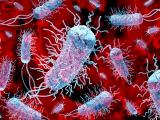Jan 26, 2007 (CIDRAP News) California agriculture officials are encouraging growers and producers to sign on to a plan to voluntarily bolster produce safety standards, though a state legislator says only laws can force changes needed to prevent future produce outbreaks.
The measures come on the heels of three recent widespread Escherichia coli O157:H7 outbreaks. One, linked to fresh spinach, killed 3 people and sickened about 200, and two were traced to prepackaged lettuce served at Taco Bell and Taco John's restaurants, sickening 152.
In the spinach outbreak, contamination was traced to cattle manure from pastures next to Salinas Valley spinach fields. In the Taco John's outbreak, the implicated O157:H7 strain matched samples from dairy farms near lettuce fields in California's Central Valley. In both cases, state and federal officials aren't certain how the bacteria contaminated the produce.
Two days ago the California Department of Food and Agriculture (CDFA) released a marketing agreement that food handlers and producers can join, which states that they accept products only from farmers who follow specific food safety procedures. Products certified by state-authorized inspectors and grown with good agricultural practices can carry an official seal to assure consumers.
The marketing agreement will be overseen by the state of California, but it was drafted by the produce industry, including Western Growers, an agricultural trade organization that represents growers, packers, and shippers in California and Arizona and accounts for half of the nation's fresh produce. The agreement covers leafy greens such as spinach, lettuce, and chard.
Safety measures in the marketing agreement have not been specified yet, but they will probably set allowable bacteria levels in irrigation water and dictate the size of fences used to keep animals out of crops, according to an article in the Monterey Herald today.
Steve Lyle, spokesperson for the CDFA, told the Herald that if enough produce companies endorse the marketing agreement by Feb 5, the department will certify it. The CDFA has not determined the minimum number of companies that must join the agreement.
"The start of the marketing agreement marks the beginning of the industry's delivery on a promise to do everything possible to restore the confidence of the nation in our products," said Tom Nassif, president and chief executive officer of Western Growers, in a press release 2 days ago. "Last year we made a commitment to declare war on food borne illnesses in the fresh produce; this is the opening salvo in that war."
Yet California State Sen. Dean Florez, who represents an agricultural region of the San Joaquin Valley, said self-regulation has been tried and has done little improve produce safety. He said he will introduce bills on Feb 1 that would require growers to separate crops from feedlots and dairies, test irrigation water for bacteria, and set standards for the size and durability of fencing to keep wild animals off the fields, according to an article yesterday in the Los Angeles Times.
Florez told the Associated Press 2 days ago that his proposals would ban the use of manure for fertilizer and reclaimed water for irrigation. Shippers and handlers would be required to create a tracking system to quickly identify where contaminated produce was grown in the event of an outbreak.
However, United Fresh Produce Association, which calls itself the nation's largest agricultural trade group, based in Washington, DC, has called for more federal oversight to drive stricter produce safety standards. In a latter to its members, association cochairs Maureen Marshall and Mark Miller said voluntary efforts aren't strong enough, the Times reported.
David Acheson, chief medical officer for the Food and Drug Administration's (FDA's) Center for Food Safety and Applied Nutrition, told the Times that federal regulation seems like a step in the right direction. "We look forward to working with United Fresh Produce," he said.
The FDA is already investigating problems with contaminated leafy greens. In August 2006, the agency announced its Lettuce Safety Initiative, which will involve an examination of growing practices as well as conditions in storage and packing facilities in California's Salinas Valley. Of 10 US outbreaks of E coli O157:H7 linked to lettuce and spinach since 1995, 8 have been traced to that region.
















